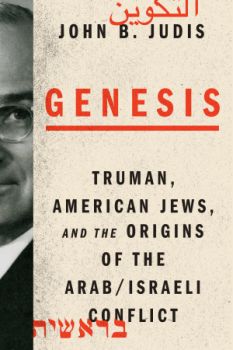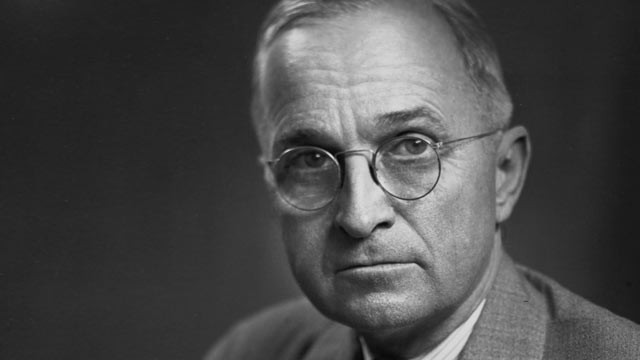by Barbara Slavin*
With U.S.-mediated Israel-Palestinian peace talks once again dangling over the abyss, a new book has kicked up controversy over the roots of U.S. policy toward Israelis and Palestinians.
In Genesis: Truman, American Jews, and the Origins of the Arab/Israeli Conflict, John Judis, a senior editor at The New Republic, argues that President Harry Truman was more ambivalent about the creation of the state of Israel than is commonly known.
 While Truman famously told audiences after he left the presidency that he considered himself a modern-day Cyrus — after the Persian king who freed Jews from Babylonian captivity in the sixth century B.C. — Truman actually preferred a federation of Arabs and Jews to a Jewish-run state and worried about the impact of favouring Zionist claims over Arab ones, according to Judis.
While Truman famously told audiences after he left the presidency that he considered himself a modern-day Cyrus — after the Persian king who freed Jews from Babylonian captivity in the sixth century B.C. — Truman actually preferred a federation of Arabs and Jews to a Jewish-run state and worried about the impact of favouring Zionist claims over Arab ones, according to Judis.
“His preference was for a plan negotiated by American Henry Grady and British official Herbert Morrison that recommended a federated Palestine jointly administered by Arabs and Jews,” Judis writes. “‘Zionist pressure killed the plan,’ ” Judis quotes Truman as saying.
While the plan — as Judis acknowledges — was not very realistic given strong Zionist desire for a Jewish state, the impact of the Holocaust on US and global politics and Britain’s eagerness to shed expensive overseas commitments after World War II, Judis’s depiction of Truman’s concerns have upset some American Jews and others who prefer a less nuanced narrative about the U.S. role in Israel’s origins.
Among those criticising Judis is Leon Wieseltier, a colleague at The New Republic, who in an email to historian Ron Radish that was published by the hawkish Washington Free Beacon accused Judis of being “a tourist in this subject” with a “shallow, derivative, tendentious, imprecise and sometimes risibly inaccurate” understanding of Zionist and Jewish history.
Wieseltier also accuses Judis of insulting Jews, showing “shocking indifference” to their fate after the Holocaust and even being a disciple of communist radical Rosa Luxemburg.
Peter Beinart, a former colleague of Judis’s at The New Republic whose own recent book — “The Crisis of Zionism” — also created quite a stir, wrote in an email that much of the criticism of Judis as “anti-Israel” and anti-Jewish was patently unfair.
“I honestly don’t know what people mean when they say John is ‘anti-Israel,’” Beinart wrote. “It’s such an overused and ill-defined phrase. I think what he wants for Israel today is the same thing that most Israelis who care about democracy want: a two state solution, a democratic Jewish state and an end to Israeli control over millions of stateless Palestinians.”
Judis discussed the controversy at an appearance in Washington earlier this week before an audience at the Centre for the National Interest. He said that he had been interested in the subject of how Israel came to be since he edited an essay by Noam Chomsky in 1971 that advocated a two-state solution for Israel and the Palestinians before that was fashionable again.
The Arab side of the debate, Judis said, has been obscured by the events of World War II and the Holocaust and by the fact that the Jews of Eastern and Central Europe had nowhere to go but British Mandate Palestine after the U.S. and other Western countries shut off immigration following World War I.
“If immigration had not been closed off, Israel would have been located somewhere between Silver Spring [Maryland] and Great Neck [New York],” Judis quipped, referring to two suburbs with large numbers of descendents of Jewish immigrants.
Truman, Judis said, had tremendous sympathy for the 50,000 Jewish survivors of the Holocaust who were stuck in displaced persons camps in Europe after World War II. But he was “not a Christian Zionist” like former British Foreign Secretary Arthur James Balfour of the 1917 Balfour Declaration fame or the prime minister at the time, David Lloyd George, or even President Woodrow Wilson.
“He did not have a special attachment to the Jewish people,” Judis said of Truman.
In his book, Judis writes that “Truman’s foreign policy views were grounded in personal morality. He saw the world divided between good guys and bad guys and between underdogs and bullies. He worried about fairness.”
Judis sees the world in shades of grey. Among his more incendiary comments in the book — from the point of view of traditional Zionists — is that “in historical terms, the Zionist claim to Palestine had no more validity than the claim by some radical Islamists to a new caliphate.”
Asked what was new in his account, given other revisionist histories of Israel’s creation primarily by Israeli authors such as Ari Shavit and Benny Morris, Judis said the book would not have caused such a stir if it had been published in Europe or Israel. “What’s new is it is being published in the U.S….The idea of the two sides of Truman — that’s a different way of doing it.”
While some books attribute Truman’s decision to recognise Israel to his being a Christian Zionist and others say Truman was merely bowing to domestic politics and the power of a Jewish lobby, Truman had “a principled view but at some point got frustrated and gave up,” Judis said.
As for the book’s relevance to the current Mideast impasse, Judis said he hopes to convince more Americans of the legitimacy of the Palestinian case to help U.S. leaders mediate a fair and durable solution to the crisis. “We have to recognise the Arab side better and recognise that they have a real beef,” he said.
“I can’t solve the situation but the book might have a slight effect on changing how people feel about this issue,” Judis said.
Jewish Democrats are increasingly less supportive of the policies of right-wing Israeli governments, Judis said, but “the Republicans are going in the opposite direction.”
He cited the recent furor over comments by New Jersey governor Chris Christie, a possible candidate for president in 2016, referring to the West Bank as “occupied” territory during a speech in Las Vegas in front of wealthy Republican Jews. Christie has since apologised for not using the adjective “disputed.”
U.S. domestic politics have always played a role in Washington’s Middle East policy although some presidents — among them Dwight Eisenhower — were more willing to confront the Jewish state. Judis quotes a famous line by Truman that “I have to answer to hundreds of thousands who are anxious for the success of Zionism; I do not have hundreds of thousands of Arabs among my constituents.”
Even after the U.S. recognised Israel in May 1948, Judis says that Truman pressed for Israel to allow Palestinian refugees to return and to adjust the borders of Israel in a manner more favourable to Arabs.
However, Arab divisions — and the willingness of many Arab states to use the Palestinian cause for their own purposes – have also jeopardised subsequent efforts at peace talks, Judis acknowledges.
“Almost every American president since Truman has tried to find a way to improve the lot of Palestinian Arabs,” Judis writes. “Yet Truman’s successors have, as a rule, suffered the same fate as he did.”
*This article was first published by IPS News and was reprinted here with permission.






John said,
“The only way we can achieve change now is to heighten the BDS campaign against Israeli racist supremacism until such time as they accept an equitable two-state or single-state solution.
But John, a day or so ago you said the only thing we can do to achieve change regarding Israel is to have Congress stop military aid.
There are a lot of measures a strong Executive can take to restructure the relationship, and the Congress is not required as you acknowledge here by focusing on BDS. There’s no tosh about it, my friend.
Renfro says:
April 5, 2014 at 12:23 pm
“I am glad Judis did the book but there nothing in it that we researchers haven’t found long ago in the private papers of Truman and adm memos of the time.”
I’m pleased that he has written the book too. But it’s because I’m political on this particular foreign policy issue. Judis is a well known journalist and public intellectual from the East *and* apparently Jewish, which strikes me as especially important. It means it will be read widely where if it had been written by a typical academic historian, and even if it had won the Bancroft Prize, it would have sold something like five or six thousand copies, lots going to the shelves of libraries to gather dust. That’s not going to be the fate of Mr. Judis’ book and it will be seized upon by the best non-fiction reviewers. This is one of those little celebratory moments in a decades-long grind to rectify these injustices. It’s fleeting so savor it.
Opinion polling in those days was even more of an inexact science than it is now.
The polling organisations came to the conclusion days – if not weeks – before polling day that Dewey had it won – so they just stopped polling!
Virtually all of the main US newspapers published the predicted while the votes were being counted overnight under the headline “Dewey Wins”, which Truman gleefully held up in a number of photographs.
After that, all the polling organisations learned the lesson to not take the result of future elections for granted and to carry on polling right up until the last possible moment.
Once the correct result was known, a lot of red faced journalists and newspaper owners had to re-write their copy and re-publish their papers.
Great fun for Truman and his supporters.
I remember when Obama was elected to his first term. Many of my friends over here in England and the UK came to me in virtual raptures of delight, asking me what I though of Obama’s being elected POTUS.
My response was “I will wait and see” how he did in the position. I am still waiting.
I am sorry to say – bearing in mind the massive amount of goodwill he received when first elected – that I believe Obama will turn out to be a huge disappointment.
Rather like Blair before him, I think he is more concerned about his future AFTER the presidency and how he can become a member of the US richest persons’ club than anything else.
An archer can fire more than just one arrow with their bow.
A golfer will use different clubs depending upon the terrain being traversed.
Some approaches are more tactical while other are much more strategic or long-term in nature.
It is important to use all the weapons at one’s disposal – sometime singly and sometimes in unison.
An important lesson is to learn from the successes of one’s enemy, as well as learn from their mistakes.